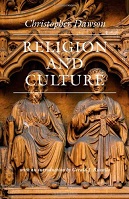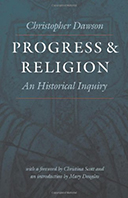Christopher Dawson first conceived the idea of a history of culture when, on a visit to Rome in his undergraduate days, he sat on the steps of the Capitol overlooking the ruins of the Roman Forum. His interest in religion was perhaps innate, but was no doubt reinforced by an ancestry populated by a mixture of clergymen and soldiers, including his grandfather, the Vicar of Hay on the Welsh Borders and a Huguenot ancestor who was chaplain to George III.
Progress and Religion was the first book in which he crystallised one of the major themes of his work, namely that religion has a unique place in human culture and indeed can be seen as the key to history. From his wide-ranging study of world history he concluded that it is religion that gives each culture its vitality. “A society which has lost its religion becomes sooner or later a society which has lost its culture”, he wrote.
The Roots of European Culture
Based on this theory, Dawson was passionately concerned about the fate of European culture and saw the study of European history as essential to its revitalisation. He was an advocate of a “United States of Europe”, believing that the unique traditions and values of each nation needed to be strengthened within a common European culture. To this end he promoted the study of European culture from its beginnings, with a special emphasis on the study of Christian culture which, in his view, was responsible for many of the distinctive features of European culture, including the emphasis on individual liberty.
“Culture”, he wrote in The Formation of Christendom, “is a very fragile thing” which needs to be constantly nurtured. He also likened it to a plant which “must have its roots in the earth, and for sunlight it needs to be open to the spiritual.” Religion, for him, is not the relic of a primitive and superstitious past. On the contrary, “the religious instinct is part of the nature of man”. All these reasonings, supported by the findings of his immense research, convinced him that, in our times as well, it is necessary to restore a synthesis between religion and society.


